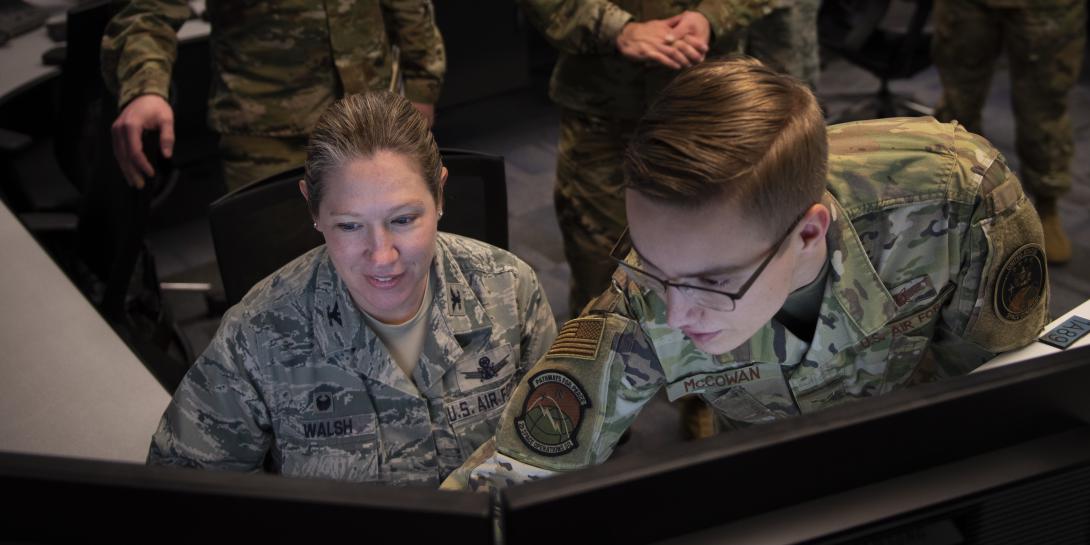Space Force Launches Data Governance Council
The U.S. Space Force is pursuing a comprehensive data strategy, designed to harness data for strategic advantage. This next-generation data management effort is meant to be more of a precise engineering discipline—rather than an ad hoc organizational effort—and as such, includes the establishment of an associated governing body.
The U.S. Space Force Data Governance Council was created to make recommendations to the service’s chief data office regarding data governance and technical decisions, explained the service’s Chief Data Officer Mark Brady, in a recent interview with SIGNAL Magazine.
The service’s Chief of Space Operations, Gen. John “Jay” Raymond—who is dual-hatted as the commander of U.S. Space Command and the U.S. Space Force— recently approved the council’s establishment, Brady reported.
“The purpose of the council is to bring the various sub-organizations within the Space Force together to get their ideas, their concerns, their input, and then build on that in order to have an enterprise effort,” he said. “Issues identified from individual stakeholders are brought to light through the council and mediated there. Information about recent developments also flows out from the council members to Space Force units.”
The new organization is examining how to comprehensively document the Space Force’s data systems, databases and data models, and how to define data standards for information sharing, the chief data officer said. In addition, the council is looking at how to establish uniform governance for data access to maximize authorized data use for the service’s missions—as the Space Force is trying to get away from the idea of data owners and informal access of data sets.
Specifically, the governing body will be composed of officials from: the former 14th Air Force, now the Space Operations Command; S2 – intelligence; S3/6 – operations and communications; S5 – planning; S9 – Analysis; Science and Technology; Space and Missile Systems Center; the 18th Space Control Squadron; the Space Command and Control development program; the National Space Defense Center; the Combined Space Operations Center; and the Space Security and Defense Program.
“The U.S. Space Force is a lean, agile service,” Brady noted. “Data experts at the rank of colonel and lieutenant colonel were invited to join the council. The council will grow as the service grows.”
The governing body will also include representatives from the Space Force’s future field commands: Systems Command, which will develop new platforms, and Star Command, which will be responsible for providing training and readiness to warfighters.
Brady added that each representative on the council has authority to make decisions and provide input on behalf of their respective units. “We prioritized expertise over rank to create an expert council with mixed seniority,” he said. “Members of our council are people who understand that formulating our data into a war-winning asset is vitally important to ensure the Space Force can continue to operate effectively and efficiently in the space domain.”
The data governing body, which meets monthly, also will oversee several data working groups that sprung up spontaneously before the service formed the Chief Data Office. The service is working to brief the council on the groups’ progress, and in turn, the council “will direct and coordinate the groups so they are all pulling in the same direction,” he said. “Prior to the council, these working groups had the expertise but not the coordination or mandate to make it over the finish line. Under the council these groups will reach their full potential.”
In the long-term, the Space Force Data Governance Council will endeavor to:
- build enterprise data systems for discovery, understanding, access, integration and analysis of data;
- ensure that all data is authoritative, which means that every analysis on a particular question will utilize algorithms to provide consistent and accurate results; and
- oversee the creation of related data systems that will be more efficient, fully integrated and run faster with enhanced accuracy.
“Space is an enormous place and things are moving at thousands of miles per hour,” the chief data officer noted. “Speed and precision are highly valued.”
Additionally, the council will tackle new issues arising from the member units and will sponsor regular data-related training sessions to help the service build up its expertise, he said. “Data management is really a team effort,” Brady said. “We're really not doing anything if we're not working as team, so we want this to be enterprise wide.”






Comment
Excellent decision; One day,
Excellent decision; One day, we will be able to see our planet's path to the stars , as one of peaceful Exploration. We have many cousins through out the galaxies. Our unified approach will be the precursor, of the day when we can speak with one voice, as the Earth; and hopefully be able to join with a Federation of Planets, for the common good. Our true future is not of War. Our future is that of the Explorer!! We know that the Air traffic controllers speaking the common language of English, demonstrated the unity of working together for the greater good, with great success. Let's try to keep our eyes on the ball, with the ball being the Unity of our planet, for Space Exploration, and the common good. B.Widaman
Comments